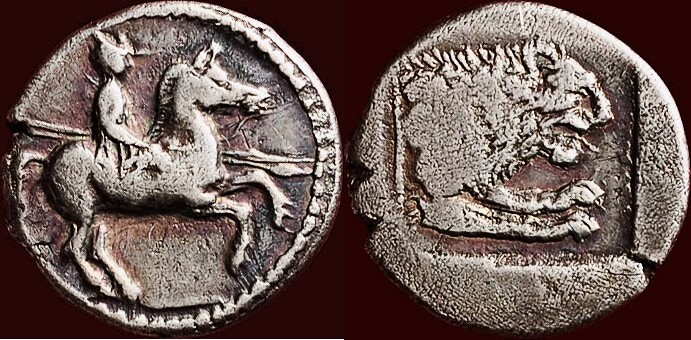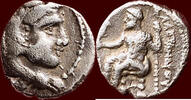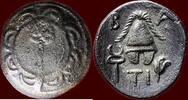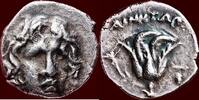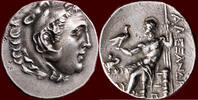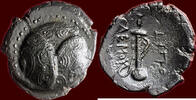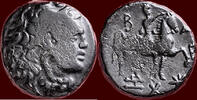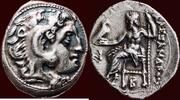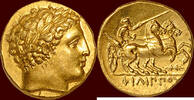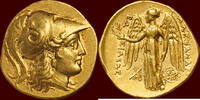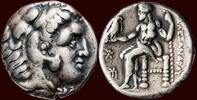MA-ID: 8193002010
Customer feedback Henzen
Schnelle Lieferung. Super Ware. Vielen Dank!
O.K.
perfekt !!!
Great coin, quick delivery, thanks!
AR Tetrobol 445 - 438 BC v. Chr. KINGDOM OF MACEDONIA - PERDIKKAS II, circa 450-413 BC - Aigai, circa 445 - 438 BC vf
Munthandel G.Henzen 

10
On MA-Shops since 10 years
7244 ratings,
100 % Positive (last 24 months)
Worldwide shipping
316.44 £365,00 EUR
Import tax may be added
+ 21.67 £ shipping ( to United Kingdom )
Delivery time: 5 - 8 days
+ 21.67 £ shipping ( to United Kingdom )
| Customer Support +49 (0)2871 2180 383 |
| Payment methods |
| Wire Transfer |
weight 2,41gr. | silver Ø 15mm.
obv. Macedonian hunter riding horse right, wearing kausia and holding two spears
rev. Forepart of lion right, vertical line of dots behind, within shallow incuse square.
After the death of Alexander I in 454, it was his eldest son Alketas II who succeeded him. But Macedonia began to fall apart. Macedonian tribes became almost completely autonomous, and were only loosely allied to the king. Perdikkas II was a younger son of Alexander I, by whom he had four brothers, Alketas II, Philippos, Menelaus and Amyntas, and a sister, Stratonice. King Alketas II was murdered circa 450 BC, at the hands of Perdikkas′ son Archelaus I, which resulted in Perdikkas′ elevation. Perdikkas became the new king of Macedonia. By 434, Perdikkas′ younger brother Philippos was challenging Perdikkas for the throne, having enlisted the support of Athens and King Derdas of Elimea. Perdikkas responded by stirring up rebellion in a number of Athenian tribute cities, including Potidaea. Athens responded with force, and sent 1000 hoplites and 30 ships to Macedonia where they captured Therma. They went on to besiege Pydna, where they were met by reinforcements of a further 2000 hoplites and 40 ships. However, as the Athenians were besieging Pydna, they received news that Corinth had sent a force of 1600 hoplites and 400 light troops to support Potidaea. In order to combat this new threat, Athens made an alliance with Perdikkas, and proceeded to Potidaea. Perdikkas immediately broke the treaty and marched to Potidaea. While the Athenians were eventually victorious, the battle (along with the Battle of Sybota) directly led to the Peloponnesian War. After this, Perdikkas was allied to the Spartans and, in 424, helped the Spartan Brasidas to take Amphipolis from the Athenians, one of her most important colonies, mainly for its ready access to timber for her fleets. This was a severe blow to Athens, and would tie them to Macedonian timber for years to come, which strengthened Macedonia′s bargaining power considerably. In return for this, the Spartans helped Perdikkas secure his borders, by leading an assault on King Arrhabaeus of Lyncestis, with the promise of support from the Illyrians (Battle of Lyncestis). However, the Illyrians switched sides and attacked Perdikkas and his Spartan allies. The poorly trained Macedonian troops fled, and so the Spartans also retreated and attacked the Macedonian baggage train in anger. This soured relations between Macedonia and the Peloponnese for years to come, and pushed Perdikkas closer to Athens, allying himself with them in 423. By 417, Perdikkas had left the Athenians and joined the Spartan-Argive alliance. Just four years later, bowing to Athenian pressure, Perdikkas broke with the Peloponnese, and aided Athens in their attack on Amphipolis. In 413 BC he died, leaving his son Archelaus as heir. HGC 3, no.790 | Weber collection- (cf.2022) | McClean 3278 (Alexander I)
Babelon Traité Pl.XLVIII, 18 | SNG.ANS.50 | Raymond 1953, group IV, 185b
SNG.Copenhagen 498 | SNG.München 18 R
Attractive coin with patina. Rare.
vf
obv. Macedonian hunter riding horse right, wearing kausia and holding two spears
rev. Forepart of lion right, vertical line of dots behind, within shallow incuse square.
After the death of Alexander I in 454, it was his eldest son Alketas II who succeeded him. But Macedonia began to fall apart. Macedonian tribes became almost completely autonomous, and were only loosely allied to the king. Perdikkas II was a younger son of Alexander I, by whom he had four brothers, Alketas II, Philippos, Menelaus and Amyntas, and a sister, Stratonice. King Alketas II was murdered circa 450 BC, at the hands of Perdikkas′ son Archelaus I, which resulted in Perdikkas′ elevation. Perdikkas became the new king of Macedonia. By 434, Perdikkas′ younger brother Philippos was challenging Perdikkas for the throne, having enlisted the support of Athens and King Derdas of Elimea. Perdikkas responded by stirring up rebellion in a number of Athenian tribute cities, including Potidaea. Athens responded with force, and sent 1000 hoplites and 30 ships to Macedonia where they captured Therma. They went on to besiege Pydna, where they were met by reinforcements of a further 2000 hoplites and 40 ships. However, as the Athenians were besieging Pydna, they received news that Corinth had sent a force of 1600 hoplites and 400 light troops to support Potidaea. In order to combat this new threat, Athens made an alliance with Perdikkas, and proceeded to Potidaea. Perdikkas immediately broke the treaty and marched to Potidaea. While the Athenians were eventually victorious, the battle (along with the Battle of Sybota) directly led to the Peloponnesian War. After this, Perdikkas was allied to the Spartans and, in 424, helped the Spartan Brasidas to take Amphipolis from the Athenians, one of her most important colonies, mainly for its ready access to timber for her fleets. This was a severe blow to Athens, and would tie them to Macedonian timber for years to come, which strengthened Macedonia′s bargaining power considerably. In return for this, the Spartans helped Perdikkas secure his borders, by leading an assault on King Arrhabaeus of Lyncestis, with the promise of support from the Illyrians (Battle of Lyncestis). However, the Illyrians switched sides and attacked Perdikkas and his Spartan allies. The poorly trained Macedonian troops fled, and so the Spartans also retreated and attacked the Macedonian baggage train in anger. This soured relations between Macedonia and the Peloponnese for years to come, and pushed Perdikkas closer to Athens, allying himself with them in 423. By 417, Perdikkas had left the Athenians and joined the Spartan-Argive alliance. Just four years later, bowing to Athenian pressure, Perdikkas broke with the Peloponnese, and aided Athens in their attack on Amphipolis. In 413 BC he died, leaving his son Archelaus as heir. HGC 3, no.790 | Weber collection- (cf.2022) | McClean 3278 (Alexander I)
Babelon Traité Pl.XLVIII, 18 | SNG.ANS.50 | Raymond 1953, group IV, 185b
SNG.Copenhagen 498 | SNG.München 18 R
Attractive coin with patina. Rare.
vf
Please respect our order minimum of 20 Euros. For EU only IBAN payment please. Shippings to China are on risk of the buyer and only payment by bankwire or WISE. Shipping will take place within 5 days after receipt of payment. Sendings to Russia,Ukraine and Israel are not possible. Additional administration- and risk costs for PayPal & creditcard payments. No PayPal or creditcardpayments possible for orders over 10.000 euro.
| Shipping fees | ||||
|---|---|---|---|---|
| up to 86.70 £ | 86.70 £ to 433.48 £ | 433.48 £ to 866.95 £ | over 866.95 £ | |
| Argentina | 27.74 £ | 27.74 £ | 34.68 £ | 34.68 £ |
| Australia | 30.34 £ | 30.34 £ | 34.68 £ | 34.68 £ |
| Belgium | 8.24 £ | 9.54 £ | 11.27 £ | 15.61 £ |
| Brazil | 47.68 £ | 47.68 £ | 47.68 £ | 47.68 £ |
| Bulgaria | 12.14 £ | 13.87 £ | 30.34 £ | 39.01 £ |
| Chile | 43.35 £ | 43.35 £ | 43.35 £ | 43.35 £ |
| China | 34.68 £ | 34.68 £ | 43.35 £ | 43.35 £ |
| Denmark | 9.97 £ | 11.27 £ | 13.87 £ | 17.34 £ |
| Germany | 8.24 £ | 9.54 £ | 11.27 £ | 15.61 £ |
| Estonia | 11.27 £ | 12.14 £ | 13.00 £ | 21.67 £ |
| France | 8.24 £ | 9.54 £ | 13.87 £ | 21.67 £ |
| Greece | 13.00 £ | 21.67 £ | 26.01 £ | 30.34 £ |
| United Kingdom | 21.67 £ | 21.67 £ | 22.54 £ | 24.27 £ |
| Hong Kong | 34.68 £ | 34.68 £ | 43.35 £ | 43.35 £ |
| India | 30.34 £ | 30.34 £ | 34.68 £ | 43.35 £ |
| Indonesia | 30.34 £ | 30.34 £ | 34.68 £ | 34.68 £ |
| Israel | 173.39 £ | 173.39 £ | 173.39 £ | 173.39 £ |
| Japan | 34.68 £ | 34.68 £ | 34.68 £ | 34.68 £ |
| Cambodia | 56.35 £ | 56.35 £ | 56.35 £ | 56.35 £ |
| Canada | 26.01 £ | 26.01 £ | 30.34 £ | 30.34 £ |
| Liechtenstein | 17.34 £ | 17.34 £ | 21.67 £ | 21.67 £ |
| Luxembourg | 9.54 £ | 11.27 £ | 13.87 £ | 21.67 £ |
| Malaysia | 30.34 £ | 30.34 £ | 34.68 £ | 39.01 £ |
| Netherlands | 7.37 £ | 7.37 £ | 9.54 £ | 12.14 £ |
| Norway | 21.67 £ | 21.67 £ | 26.01 £ | 30.34 £ |
| Austria | 9.97 £ | 10.84 £ | 13.00 £ | 21.67 £ |
| Poland | 11.27 £ | 12.14 £ | 14.30 £ | 21.67 £ |
| Portugal | 11.27 £ | 12.14 £ | 15.61 £ | 21.67 £ |
| Romania | 13.87 £ | 15.61 £ | 21.67 £ | 30.34 £ |
| Russian Federation | 173.39 £ | 173.39 £ | 173.39 £ | 173.39 £ |
| Switzerland | 26.01 £ | 26.01 £ | 34.68 £ | 34.68 £ |
| Serbia | 21.67 £ | 21.67 £ | 26.01 £ | 30.34 £ |
| Singapore | 30.34 £ | 30.34 £ | 30.34 £ | 34.68 £ |
| Slovakia | 11.27 £ | 13.00 £ | 17.34 £ | 21.67 £ |
| Spain | 9.97 £ | 11.70 £ | 14.30 £ | 21.67 £ |
| Sri Lanka | 30.34 £ | 30.34 £ | 34.68 £ | 39.01 £ |
| Czech Republic | 10.40 £ | 12.14 £ | 15.61 £ | 21.67 £ |
| Ukraine | 173.39 £ | 173.39 £ | 173.39 £ | 173.39 £ |
| Hungary | 12.14 £ | 13.87 £ | 21.67 £ | 26.01 £ |
| United States | 27.74 £ | 27.74 £ | 30.34 £ | 34.68 £ |
| European Union | 13.00 £ | 14.74 £ | 21.67 £ | 26.01 £ |
| World | 34.68 £ | 34.68 £ | 43.35 £ | 43.35 £ |
Information
Online orders are welcome as always and will be shipped directly.
|
Seller Home | 0Shopping cart | Terms of sale | Contact | MA Terms of sale | Privacy policy | Warranty | MA-Shops New Items Copyright ® 2001-2025, MA-SHOPS Coins All Rights Reserved. Designated trademarks and brands are the property of their respective owners. |
 Buy coins with warranty
Buy coins with warranty



